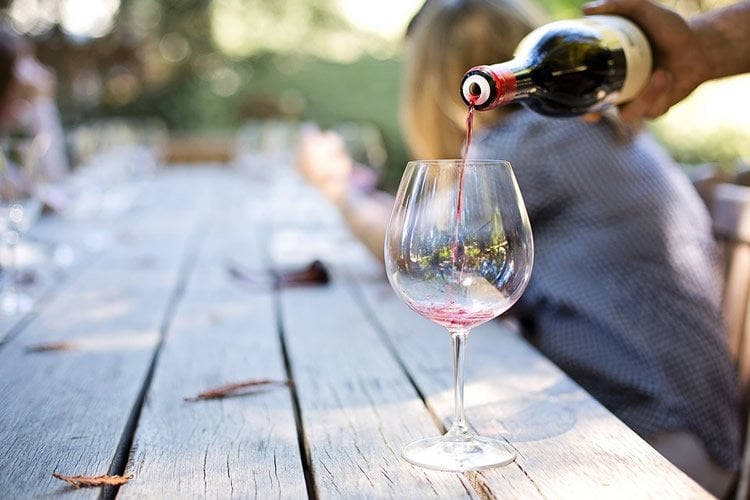Summary: A new study finds wine-derived human gut metabolites may have neuroprotective capabilities.
Source: Frontiers.
Researchers have now found out how wine compounds are protective against neuronal death: they should pass through your stomach first.
Let there be no misunderstanding: heavy alcohol intake has severe harmful effects. But, for several years, researchers have been finding that moderate wine intake can be beneficial in delaying the onset of cognitive impairments associated with aging and neurodegenerative diseases like Parkinson’s and Alzheimer’s disease.
Dr. Esteban-Fernández from the Institute of Food Science Research in Madrid and her colleagues have been investigating the molecular mechanisms underlying the neuroprotective actions of wine, recently published in Frontiers in Nutrition.
Instead of investigating wine directly, they studied the compounds that are left after the wine has passed through the gut: the so-called wine-derived human gut metabolites. They selected some of these metabolites based on their presence in the urine and feces of people consuming wine on a regular and moderate basis. To explore the neuronal effect of these compounds, they added them to human cells under stress conditions that normally lead to neuronal cell dysfunction and death. These conditions are related to the initial stages of some neurodegenerative disorders.
They found that the metabolites are protecting the cells from dying due to the stress conditions. The most striking result, however, was that the metabolites are active at different points in the cell signaling cascade that is leading to this cell death. The exact composition of the wine metabolites is therefore important in the protective neuronal effect. And this composition depends on your gut microbiota composition, as the intestinal flora breaks down the wine into the different metabolites.
“In other words, differences in our gut microbiota are leading to the different metabolites. Which underpins the idea that humans benefit from food in different ways”, Dr. Esteban-Fernández explains. “This individual difference is a factor not to be neglected to understand the health effects of certain foods. We are now in need to advance our understanding of the effect of diet in the promotion of normal brain function.”

“It is very important to understand that certain food compounds are responsible for this health benefit in protecting against the onset of neurodegenerative diseases; no medication was involved. I am not advocating to replace medicines by diet, but I want to raise more awareness how your diet is helping to prevent diseases or reduces the risk of getting sick. It is more than feasible to go to the supermarket and buy vegetables and fruit: it depends only on the individuals to maintain a balanced diet.”
As she works on the role of diet in health maintenance and disease prevention, Dr. Esteban-Fernández takes her own nutrition very serious. “I am really aware about the importance of a healthy diet enriched in vegetables, fruits, and reduced industrial saturated fats. Although I try to maintain my dietary habits as good as possible, I think it is also important to not get too obsessed. Society is nowadays full of false myths about diet, and it is the role of both science and media to avoid the spread of these rumors, as well as make people aware of the importance of diet for your health.”
Funding: Funding provided by Spanish Ministry of Economy and Competitiveness, COST Action FA 1403 POSITIVe.
Source: Julie Sloane – Frontiers
Image Source: NeuroscienceNews.com image is in the public domain.
Original Research: Full open access research for “Neuroprotective Effects of Selected Microbial-Derived Phenolic Metabolites and Aroma Compounds from Wine in Human SH-SY5Y Neuroblastoma Cells and Their Putative Mechanisms of Action” by A. Esteban-Fernández, C. Rendeiro, J. P. E. Spencer, D. Gigorro del Coso, M. D. González de Llano, B. Bartolomé and imageM. V. Moreno-Arribas in Frontiers in Nutrition. Published online March 14 2017 doi:10.3389/fnut.2017.00003
[cbtabs][cbtab title=”MLA”]Frontiers “Unravelling Fluid Flow in the Brain.” NeuroscienceNews. NeuroscienceNews, 3 May 2017.
<https://neurosciencenews.com/neuroprotection-wine-6571/>.[/cbtab][cbtab title=”APA”]Frontiers (2017, May 3). Unravelling Fluid Flow in the Brain. NeuroscienceNew. Retrieved May 3, 2017 from https://neurosciencenews.com/neuroprotection-wine-6571/[/cbtab][cbtab title=”Chicago”]Frontiers “Unravelling Fluid Flow in the Brain.” https://neurosciencenews.com/neuroprotection-wine-6571/ (accessed May 3, 2017).[/cbtab][/cbtabs]
Abstract
Neuroprotective Effects of Selected Microbial-Derived Phenolic Metabolites and Aroma Compounds from Wine in Human SH-SY5Y Neuroblastoma Cells and Their Putative Mechanisms of Action
Moderate wine consumption has shown the potential to delay the onset of neurodegenerative diseases. This study investigates the molecular mechanisms underlying the protective effects of wine-derived phenolic and aroma compounds in a neuroinflammation model based on SIN-1 stress-induced injury in SH-SY5Y neuroblastoma cells. Cell pretreatment with microbial metabolites found in blood after wine consumption, 3,4-dihydroxyphenylacetic (3,4-DHPA), 3-hydroxyphenylacetic acids and salicylic β-d-O-glucuronide, at physiologically concentrations (0.1–10 μM) resulted in increased cell viability versus SIN-1 control group (p < 0.05). Results also showed significant decreases in mitogen-activated protein kinase (MAPK) p38 and ERK1/2 activation as well as in downstream pro-apoptotic caspase-3 activity by some of the studied compounds. Moreover, pretreatment with p38, MEK, and ERK1/2-specific inhibitors, which have a phenolic-like structure, also resulted in an increase on cell survival and a reduction on caspase-3 activity levels. Overall, these results contribute with new evidences related to the neuroprotective actions of wine, pointing out that wine-derived human metabolites and aroma compounds may be effective at protecting neuroblastoma cells from nitrosative stress injury by inhibiting neuronal MAPK p38 and ERK1/2, as well as downstream caspase 3 activity.
“Neuroprotective Effects of Selected Microbial-Derived Phenolic Metabolites and Aroma Compounds from Wine in Human SH-SY5Y Neuroblastoma Cells and Their Putative Mechanisms of Action” by A. Esteban-Fernández, C. Rendeiro, J. P. E. Spencer, D. Gigorro del Coso, M. D. González de Llano, B. Bartolomé and imageM. V. Moreno-Arribas in Frontiers in Nutrition. Published online March 14 2017 doi:10.3389/fnut.2017.00003






